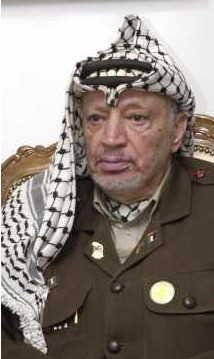
WASHINGTON (BP)–Yasser Arafat, the Palestinian Liberation Organization leader who failed to destroy the state of Israel, and later failed to make peace with it, died in the early morning of Nov. 11 at a French military hospital in Paris.
In the end, the 75-year-old Muslim, who took up arms before he was 17, left behind distraught mourners among the Palestinian people, in whose behalf he was a co-winner of the 1994 Nobel Peace Prize. But his failed leadership in recent years, marked by widespread corruption within the Palestinian Authority, left few mourners elsewhere around the world.
Among American evangelicals -– longtime supporters of Israel’s right to exist -– the mourning focused on his eternal soul.
“Yasser Arafat was a terrorist. There is no justification in our world for terrorists whether Moslem, Jewish, Christian or Baptist,” said Paige Patterson, president of Southwestern Baptist Theological Seminary in Fort Worth, Texas, said in a statement to Baptist Press.
“He was also a precious soul for whom Christ died,” said Patterson, who once had the opportunity to meet with Arafat –- and share the Gospel.
“When I shared the message of Jesus with him in Baghdad in the 1980s, I know he understood clearly but made no positive response to the Gospel. At least four or five other believers spoke to him of Jesus.
“I can only pray that, like the terrorist on the cross next to Jesus, Mr. Arafat, in his waning moments of life, remembered — and asked Jesus to be remembered in His Kingdom,” Patterson said. “Human probability does not hold out much hope, but would it not be delightful to get to heaven and find that the love and grace of Christ was still saving terrorists in 2004?”
David Dolan, author of “Holy War for the Promised Land,” published by Broadman & Holman, and an Israel-based journalist since 1980 who has covered the Mid-east peace process, Arafat and the Palestinian intifadas, or uprisings, against Israel, overviewed the PLO leader’s life to Baptist Press:
“Yasser Arafat embodied both the aspirations and the fears of his people for over three decades. Known on the street as Abu Amar, Arabic for ‘Father of the nation,’ he was indeed a towering authority figure for millions of Palestinians and other Arabs around the world.
“His early popularity was built on his unbending rejection of Israel as a valid state in the mostly Muslim Middle East,” Dolan said. “He organized many attacks upon Israeli and Jewish targets both in Israel and other places, earning him further respect from his people, many of whom are refugees or their offspring from the 1948 and 1967 Arab-Israeli wars.” Among the most notorious attacks was the massacre of 11 Israeli athletes at the 1972 Munich Olympics.
Dolan noted that “Arafat’s strategic decision to announce his readiness for a ‘two-state solution’ in 1988 was met with applause in world capitals. However, it was condemned by some radical factions of Arafat’s own Palestinian Liberation Organization, and even more so by various Islamic terror groups, especially Hamas, Islamic Jihad and Hizbullah,” Dolan recounted. “This would not have posed such a problem if these rejectionist groups were not fully backed by several regional states, including Syria, Iraq and Iran. These countries gave inspiration and material aid to Palestinian and Lebanese groups opposed to the peace process, giving them the strength to challenge Arafat directly on many occasions.
“Their violent opposition — made concrete by Hizbullah rocket attacks into northern Israel and terrorist bombings around the country — eventually succeeded in crushing the Oslo process,” the limited peace treaty Arafat signed with Israeli leaders Shimon Peres and Yitzhak Rabin in 1993 that led to the Nobel Peace Prize.
Dolan concluded: “Arguments still rage as to whether or not Arafat could or wound not stop such Palestinian terror attacks in the 1990s, but most agree he actively promoted them after the process collapsed in the year 2000. In his final years, he was widely condemned by many Arab colleagues and his citizens for widespread corruption in his Palestinian Authority, including charges that he spirited away billions of dollars of public money in secret bank accounts.”
Anis Shorrosh, himself a Palestinian and an international speaker on Islam based in Fairhope, Ala., said Arafat made “losers” of the Palestinian people.
“Somehow Arafat and his supporters time and again have sought out every possible door to lose the window of opportunity toward solving their problems with Israel when sincere international mediators offered help,” Shorrosh, author of a new book, “Islam, a Threat or a Challenge,” said in a statement to Baptist Press.
The two PLO-supported intifadas, or uprisings, against Israeli authority left a toll of thousands of “future parents [who] were killed through violent activities and … widows and widowers who lost their loved ones in these tragic years of fighting,” Shorrosh said, noting that the PLO also caused civil war in Jordan in 1971 and in Lebanon in 1986.
These tragedies underscore “the terrible consequences of hate instead of tolerance,” Shorrosh said. “Maybe now new Palestinian leaders can establish a more peaceful coexistence with their Israeli neighbors.”
–30–
















